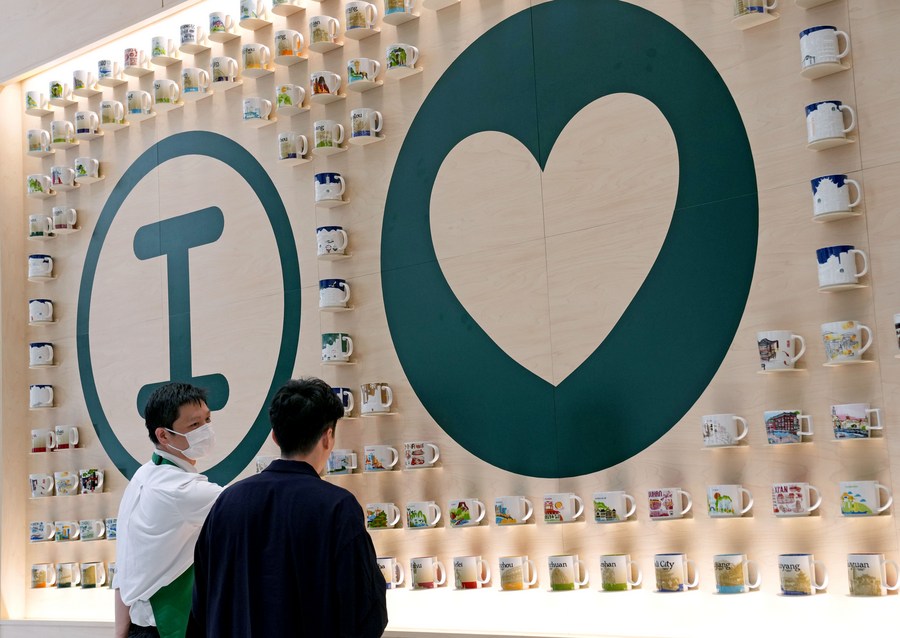Quality local beans, huge market potential boost Starbucks' confidence in China business

KUNMING -- "Stunning" was how Alan Tong, a veteran coffee industry manager, described his first taste of a new coffee by Starbucks, which uses beans from Pu'er, Southwest China's Yunnan province.
"It contained a rich flavor of tropical fruit, just the right amount of fermentation and a faint aroma of wine...," he elaborated on the latest Starbucks Reserve Yunnan Coffee product that will soon be available in Starbucks stores in China and beyond.
Thanks to a suitable climate, Yunnan produces over 95 percent of all coffee beans in China, and more than 60 percent of Yunnan coffee comes from Pu'er, a city already renowned for growing tea for over 1,000 years.
The planting area of Pu'er coffee reached 679,000 mu (45,266.67 hectares) in 2022, with an output value of over 5 billion yuan ($699.41 million).
Starbucks saw the potential of Yunnan coffee over a decade ago. "Pu'er is located on the same latitude as Ethiopia and Colombia, the world's top coffee producers, and we firmly believe that high-quality coffee can be grown here," said Tong.
In 2012, the US coffee giant established a joint venture in Yunnan to purchase locally-grown coffee beans. In the same year, a Starbucks Farmer Support Center was set up in Pu'er, the first of its kind in Asia, to further bolster the local coffee farming community.
That was what brought Tong to Pu'er to serve as the head of the center. He recalled that back then, most of the local coffee farmers did not drink coffee, let alone know what Starbucks was.
"I told them that we came to help improve their planting skills and produce better beans," said Tong. The center has sent agrotechnicians and cuppers, or professional coffee tasters, to provide free training and technical support, and teach them how to evaluate their beans.
Based on a "high quality and high price" policy, Starbucks has been buying quality local beans from Pu'er at a price 20-30 percent higher than the average market price. Farmers also gain additional incentives for specialty beans that meet or exceed Starbucks standards, which has raised their enthusiasm for planting.
Over the decade, Tong has witnessed the improvement of Yunnan coffee from trough to peak in the market. "There was a time when the price of one kilo of beans was lower than that of a cup of ordinary coffee," said Tong.
Since 2019, the price of Yunnan coffee beans has shown a rising trend, according to statistics.
Guo Qiong, a cupper who's hailed in the company for her "golden tongue," has evaluated more than 510,000 cups of coffee in Pu'er with her colleagues. She said she has captured every little progress of Yunnan coffee over the past decade.
"At first, it took about eight minutes to sort out the faulty beans, and only 20-30 percent of beans could meet our standards after sample tasting," said Guo.
Now, the sorting time has been shortened to three minutes and the passing rate of beans has exceeded 70 percent. "And I would encounter surprisingly good flavors from time to time," she added.
Cai Qingkai, a local coffee grower, made a lot of changes to his farm after learning about the energy-saving and environmentally-friendly planting methods proposed by Starbucks. He has reduced water consumption for processing per tonne of beans by 83 percent and built a sewage treatment tank.
In addition, through technical assistance, he planted more than ten cash crops such as mango and jackfruit in coffee fields. While shielding the coffee trees from excessive sunlight, they further increase the farm's profits, according to Cai.
"These measures help ensure the steady improvement of the supply and quality of local coffee beans," said Tong. "We are full of confidence in the future of Yunnan coffee."
By the end of May 2023, 2,976 coffee farms in Yunnan had been certified by the Starbucks Farmer Support Center according to the company's standards, with a total planting area of nearly 340,000 mu.
In China, a growing share of its 1.4 billion people are becoming coffee lovers, but the per capita coffee consumption still lags far behind some developed countries such as Japan and the United States, prompting global coffee brands to set their sights on the huge potential of the Chinese market.
Since 1999, Starbucks has opened over 6,200 stores in 244 cities on the Chinese mainland. Last year, it revealed plans to increase its store count here to 9,000 by 2025.
"We're set up to grow for a long period of time here. The number 9,000 is only a milestone over the course of the next three years in what is going to become an even bigger market for us," said Laxman Narasimhan, the new CEO of Starbucks, during a recent visit to Shanghai.
According to the e-commerce platform Meituan, the value of China's coffee industry was estimated at 200 billion yuan in 2022, and it is projected to reach 369 billion yuan in 2025.
Invest in China Copyright © 2026 China Daily All rights Reserved
京ICP备13028878号-6
 京公网安备 11010502032503号
京公网安备 11010502032503号





